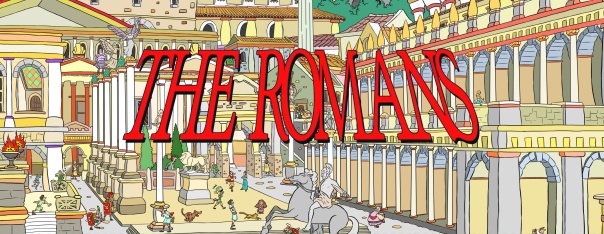Blog Archives
Roman Through the Multiverse
It has often been said that you can learn a lot about an era by how they portray Rome in its heyday. To the historians of the British Empire, the eternal city was both pomp and melancholy manifest, a promise of what could be accomplished with well-drilled lines of soldiery, but also a lingering reminder that the lights of empire would inevitably wink out. To the fascists of Italy and Germany, it was a city of racial hierarchies, Nordic masters overseeing Mediterranean laborers. For a time Americans regarded it as both an exemplar of civic duty and a suitable antagonist, that great subsumer of individuality and Jesus Christ alike. Later it became the dingy city of corruption and gang rule, populated by kleptocrats stuffing their pockets while sending children to die on foreign soil. I’ll leave it to you to guess which era thought of it in those terms.
The Ragnar Brothers (Gary Dicken, Steve Kendall, and Phil Kendall) aren’t quite striving for that degree of granularity with their latest game, The Romans. Nor do they seem to be evaluating Rome as anything other than a sequence of shifting boundaries. Even so, at some level, The Romans beholds all those contrasting interpretations and seems to query, Why not all of them?
But to make sense of that statement, first we need to talk about parallel universes.
History of the World, Part IV
Way back before the dawn of time — that’s 1991, four years prior to the release of Settlers of Catan — the design team known as the Ragnar Brothers, composed of Steve and Phil Kendall and Gary Dicken, designed a game meant to chart the rise, fall, rise, fall, rise, fall, and many more rises and falls of the kingdoms, empires, dynasties, and nation-states that shaped our history. Some of its central concepts were eventually riffed upon by Vinci in 1999, which was reshaped to became Small World in 2009. Facts! Huh!
Anyway, if you’ve played any of those games, you already know the central conceit behind History of the World. As an empire, your moment in the sun is fleeting. Then it’s decline, barbarian invasions, and eventual obscurity for you. At least your points carry over.
Doctor Congo, I Presume?
As a medium, board games tend to revolve around tried-and-true topics, uncontroversial subject matter like surviving a zombie apocalypse or building a medieval town. This is hardly surprising; with their focus on social interaction and optimal move-making, there isn’t often much room left over for heady discussion — say, of the obstacles facing a developing African nation. At best, the game will be scrutinized for casting its controversial setting as “play,” or perhaps even more damningly, for not focusing enough on the play. At worst, it could come across as downright ignorant or offensive.
DRCongo, the latest title from Ragnar Brothers, embraces the controversy. Not only is it set within the Democratic Republic of the Congo, casting its players as industrialists who collect diamonds, deploy peacekeepers to suppress insurgents, buy political offices, and get filthy rich extracting oil and minerals from the Congolese countryside, it also posits that its magnates are forces of benevolence, employing their wealth to bring about an era of stability. In essence, you will take part in some extremely spurious activities, but the end goal is surprisingly admirable.
If nothing else, DRCongo is hopelessly optimistic.


